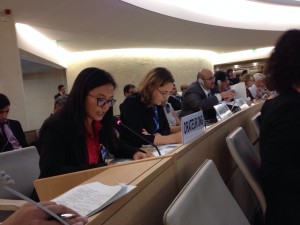
As the Human Rights Council discussed situations that require the Council’s attention, several NGOs raised their concern on the urgent and deteriorating human rights situation in Tibet.
This morning, Tsering Tsomo, speaking on behalf of the Society for Threatened Peoples (STP_Tibet_Statement), highlighted the recent shooting in Kardze (Ch: Ganzi) Tibetan Autonomous Prefecture (Sichuan Province) as a recent example of the People’s Republic of China (PRC) being caught in a downward spiral of violence in Tibet.
The Society for Threatened Peoples called for the intervention of the Human Rights Council and urged the PRC to schedule visits of the Special Rapporteur on freedom of religion and belief and the UN High Commissioner for Human Rights to the PRC including Tibetan areas.
Human Rights Watch noted that the PRC currently has 13 outstanding requests from the UNHRC Special Procedures and failed to fulfill its commitment to invite the High Commissioner for Human Rights.
The Asian Indigenous and Tribal Peoples Network (AITPN) (AITPN_statement) cited TCHRD’s recent report that Chinese security forces used machine guns against protesters in Lhasa in 2008. AITPN urged the Committee Against Torture, the Committee on the Elimination of Racial Discrimination, the Special Rapporteur on extrajudicial, summary or arbitrary executions, and other relevant mandates to intervene with PRC authorities about how TCHRD’s report contradicted their statements in 2008 that “no legal weapons were carried or used” and that security personnel “exercised maximum restraint.”
Exercising its right to reply, the PRC accused NGOs of turning a “blind eye” and trying to politicize human rights. The PRC then asserted that the PRC is a multi-ethnic society, the Constitution and other laws protect ethnic minorities, and the laws are followed. The PRC also emphasized that nobody could be above the law.
The UN HRC is an intergovernmental body that works to promote and protect human rights. The HRC works closely with Office of the High Commissioner for Human Rights and the United Nations Special Procedure mandate-holders. Together these mechanisms have been vocal in calling for human rights in the People’s Republic of China (PRC) despite the PRC’s resistance.
When the debate began yesterday, several States drew attention to the increase of arbitrary arrests and enforced disappearances (United States) in the PRC and the persecution of human rights defenders (Czech Republic). The United Kingdom urged the PRC to start meaningful dialogue with Tibetans and other ethnic minorities and to immediately release people who were arrested for exercising their Constitutional rights.
Italy on behalf of the European Union expressed concern with the human rights situation in Tibet and Xinjiang and encouraged China “to address the root causes of unrest and foster dialogue with and between different ethnic groups.”
